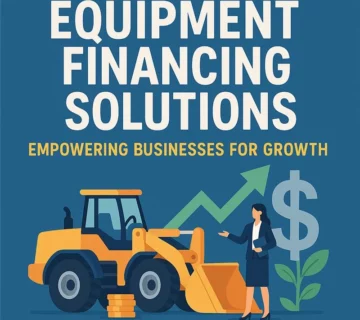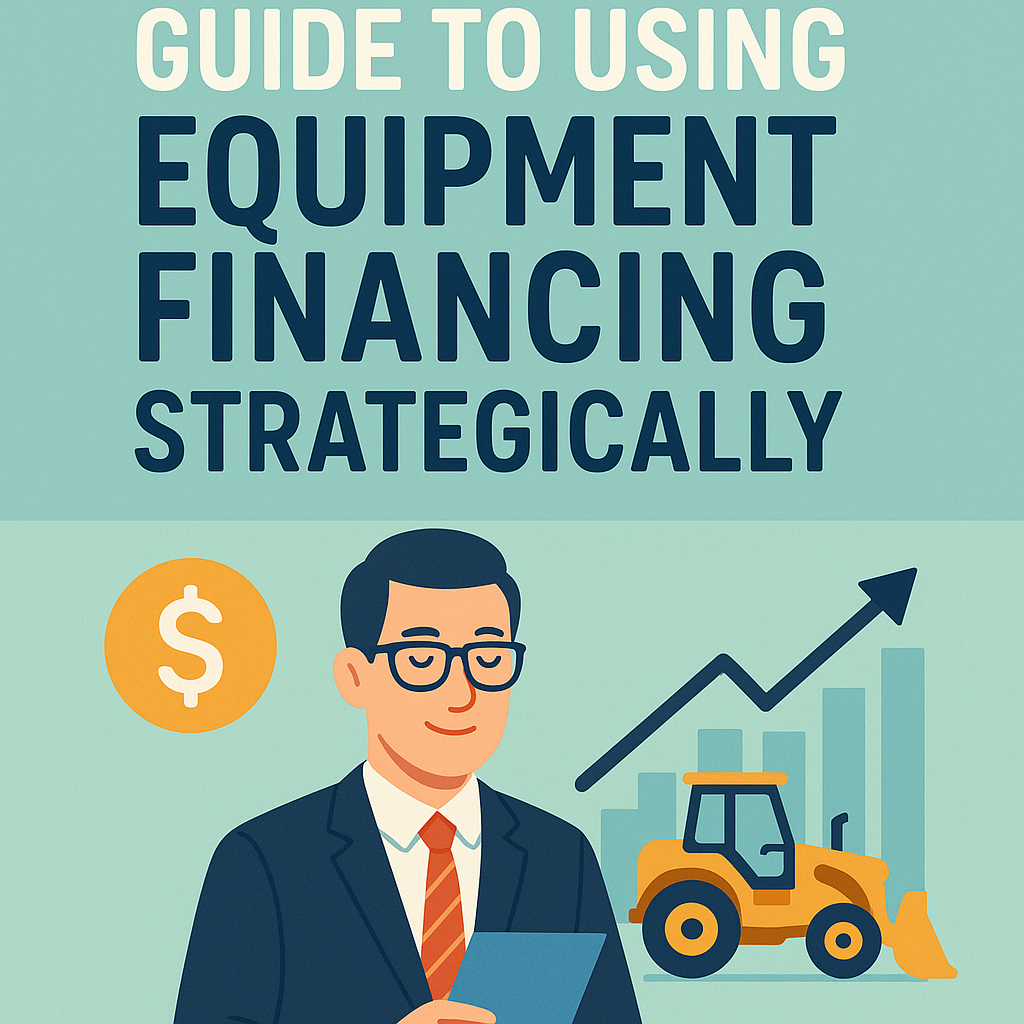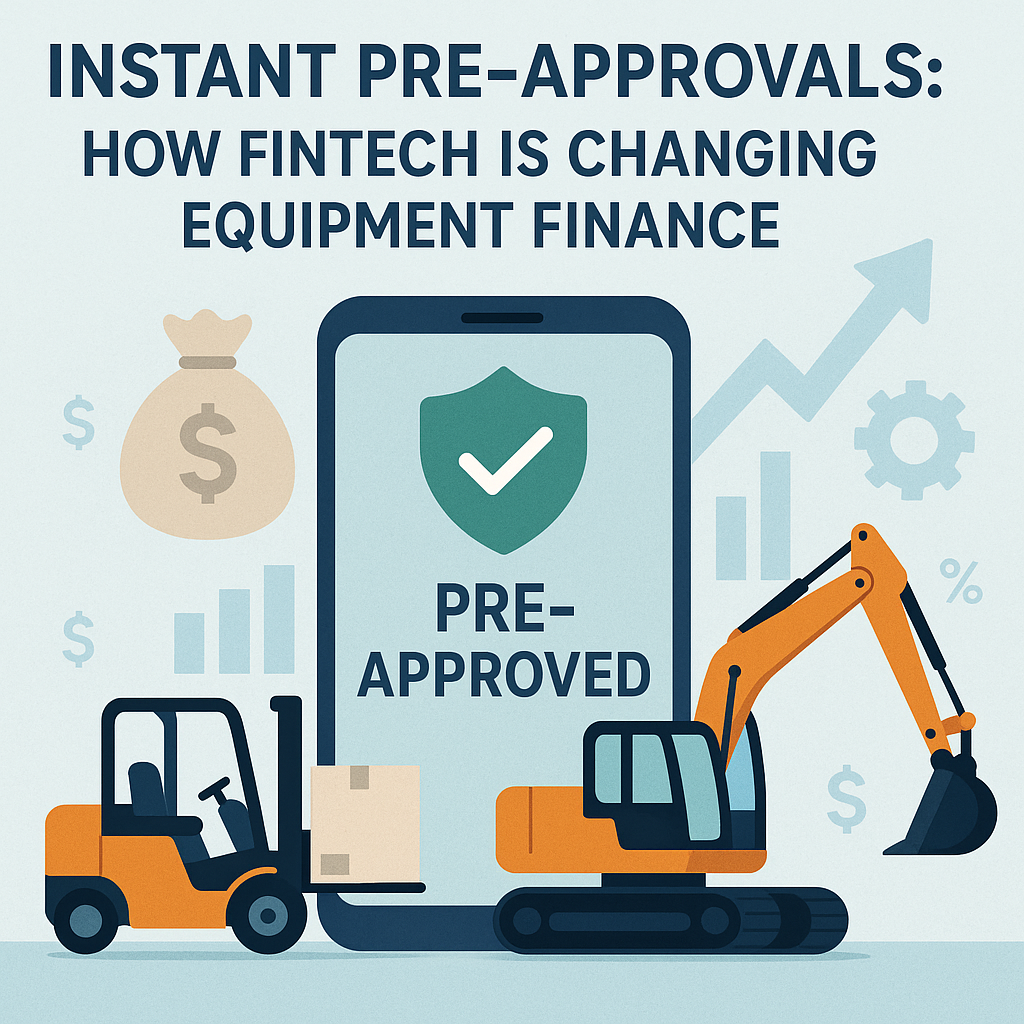Why Equipment Financing is the Key to Scaling Your Business

Whether you run a startup or an established business, expanding your operations requires significant investment, particularly in equipment. However, purchasing the latest machinery, technology, or tools can strain your cash flow and limit your financial flexibility.
Equipment financing offers businesses the ability to acquire the equipment they need without the burden of paying large upfront costs. Instead, businesses can spread the expense over a period of time through manageable payments. In this blog post, we will explore why equipment financing is the key to scaling your business and how it can unlock new growth opportunities.
What is Equipment Financing?
Equipment financing is a type of loan that allows businesses to borrow money specifically for purchasing equipment, machinery, vehicles, or technology. Rather than paying for the equipment upfront, the lender provides funds that the business can repay over a fixed term, typically in monthly installments. The equipment itself often serves as collateral, meaning that if the business defaults on the loan, the lender can seize the equipment to recoup their losses.
Types of Equipment Financing
There are two types of equipment financing:
- Equipment Loans: With an equipment loan, you borrow a specific amount of money to purchase the equipment and repay the loan with interest over time. Once the loan is fully paid off, you own the equipment outright.
- Equipment Leasing: Leasing is another option where you rent the equipment for a set period. At the end of the lease, you may have the option to purchase the equipment, return it, or upgrade to newer models.
How Equipment Financing Works
The process of securing equipment financing is relatively straightforward. Here’s how it typically works:
- Determine the Equipment You Need: Identify the specific equipment, machinery, or technology that will support your business’s growth. It’s essential to choose equipment that aligns with your long-term operational goals.
- Find a Lender: Various lenders offer equipment financing, including banks, credit unions, and specialized financing companies. It’s important to compare different financing options to find one with favorable terms and interest rates.
- Apply for Financing: Once you’ve identified a lender, you will need to submit an application. This typically includes providing financial statements, tax returns, and information about your business’s creditworthiness.
- Loan Approval: If your application is approved, the lender will outline the terms of the loan, including the interest rate, repayment schedule, and loan amount.
- Purchase the Equipment: The lender provides the funds, which you can use to buy the equipment. You then make regular payments to the lender over the agreed-upon term.
Why Equipment Financing is Essential for Scaling Your Business
1. Conserves Cash Flow
One of the most significant advantages of equipment financing is that it allows businesses to preserve their cash flow. Instead of spending a large sum upfront, businesses can make smaller, predictable payments over time. This frees up capital for other critical areas, such as marketing, hiring, and product development.
Maintaining healthy cash flow is essential for day-to-day operations, and equipment financing ensures that you can invest in growth without compromising your financial stability.
2. Access to the Latest Technology
In many industries, staying competitive means keeping up with the latest technology. However, constantly upgrading equipment can be prohibitively expensive, especially for small businesses. Equipment financing enables businesses to acquire cutting-edge technology and machinery without the financial strain of large initial payments.
Leasing options, in particular, allow businesses to continually upgrade their equipment at the end of the lease term, ensuring that they always have access to the most current tools and technology.
3. Flexible Financing Options
Equipment financing offers a range of flexible options to suit your business’s unique needs. Whether you opt for a loan or a lease, you can choose the terms and payment schedules that best fit your financial situation. Some lenders even offer seasonal payment plans, which can be particularly beneficial for businesses that experience fluctuations in revenue throughout the year.
This flexibility allows you to scale your business at your own pace, without being locked into rigid financial commitments.
4. Builds Business Credit
Taking out an equipment loan or lease and making timely payments can help build your business credit. A strong credit profile is essential for securing future financing, whether for additional equipment, expansion, or other business needs. By successfully managing your equipment financing, you demonstrate to lenders that your business is financially responsible, increasing your chances of obtaining better financing terms in the future.
5. Tax Benefits
Equipment financing can provide several tax advantages. In many cases, businesses can deduct the full cost of leased or financed equipment under Section 179 of the IRS tax code, which allows businesses to deduct the purchase price of qualifying equipment and software. Additionally, the interest paid on equipment loans may be tax-deductible.
These tax benefits can significantly reduce the overall cost of the equipment and make financing a more attractive option compared to purchasing outright.
6. Easy Equipment Upgrades
As industries evolve, the equipment and technology required to stay competitive also change. Equipment leasing offers businesses the flexibility to upgrade their machinery and tools more frequently. At the end of the lease term, businesses can return the equipment and lease newer models, ensuring they always have access to the latest advancements.
This ability to upgrade without significant financial strain can be a key factor in maintaining efficiency and competitiveness as your business grows.
How to Select the Right Equipment Financing Option
When deciding on an equipment financing option, it’s crucial to consider factors such as your business’s current financial situation, future growth plans, and the type of equipment you need. Here are some steps:
- Assess Your Financial Health: Review your business’s financial statements and cash flow to determine how much you can afford in monthly payments.
- Understand Your Equipment Needs: Consider how long you’ll need the equipment and whether it’s likely to become outdated quickly. This will help you decide between leasing or purchasing.
- Compare Lenders: Shop around for the best interest rates, terms, and payment options. Don’t forget to consider any fees associated with the loan or lease.
- Read the Fine Print: Make sure you understand all the terms of the financing agreement, including what happens if you need to terminate the lease early or if you fall behind on payments.
Common Industries That Benefit from Equipment Financing
Equipment financing is particularly useful for businesses in industries that rely heavily on machinery and technology. Some of the industries that commonly use equipment financing include:
- Manufacturing: Businesses in the manufacturing sector often need to invest in expensive machinery to produce goods efficiently.
- Construction: Heavy equipment, such as bulldozers and cranes, is crucial for construction companies to complete projects.
- Healthcare: Medical practices and hospitals frequently need to upgrade diagnostic and treatment equipment to offer the best patient care.
- Information Technology: IT companies often finance servers, software, and other technology to stay ahead in the digital age.
- Transportation and Logistics: Companies in this sector may finance vehicles, such as trucks and delivery vans, to expand their fleet.
FAQs: Equipment Financing
1. What credit score do I need for equipment financing?
Most lenders prefer a credit score of at least 600 to 650 for equipment financing. However, specific requirements may vary depending on the lender and the size of the loan.
2. Can startups qualify for equipment financing?
Yes, many lenders offer equipment financing for startups. However, startups may face higher interest rates or be required to provide a personal guarantee due to the lack of a business credit history.
3. Is equipment leasing better than buying?
It depends on your business needs. Leasing is beneficial for businesses that require frequent upgrades or cannot afford the upfront costs of purchasing. Buying is preferable for equipment with a long lifespan that you plan to use for many years.
4. What happens if I default on equipment financing?
If you default on your equipment loan or lease, the lender may seize the equipment as collateral. Additionally, defaulting can negatively impact your business credit score.
5. Can I finance used equipment?
Yes, many lenders offer financing for used equipment. However, the terms may differ from financing new equipment, with shorter loan terms and potentially higher interest rates.
6. How long can I finance equipment for?
The loan term for equipment financing typically ranges from 2 to 7 years, depending on the lender and the type of equipment being financed.
Conclusion
Equipment finance is an effective tool for firms trying to grow. By providing access to essential machinery, technology, and tools without straining cash flow, it enables businesses to grow efficiently and stay competitive. Whether you’re considering purchasing or leasing, equipment financing offers the flexibility, tax advantages, and long-term benefits that can propel your business to the next level.




No comment